Wenshu Monastery
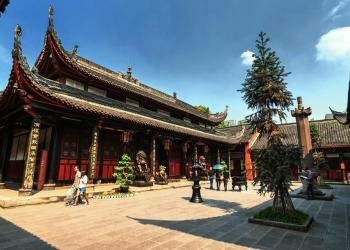
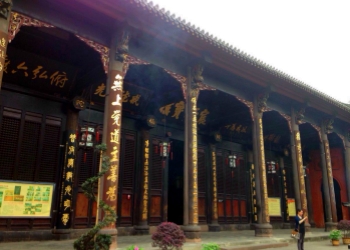
Wenshu Monastery, located at No. 66 Wenshu Yuan Street in Chengdu, Sichuan Province. It was originally built during the Tang Dynasty (618-907). Nestled in the heart of Chengdu, the Wenshu Monastery stands as one of the city's finest preserved temples, a bastion of tranquility that still houses 80 monks. Originally erected during the Southern Dynasty, the temple sprawls across a vast area of over 60,000 square meters, embracing five intricate complexes of buildings and serene gardens. Within its confines, over 180 rooms are tucked away, each housing a piece of history and culture.
The Wenshu Monastery is a veritable museum of Buddhist art, housing over 300 Buddhas from various dynasties. These statues, each with their unique story, are complemented by precious artifacts such as golden Buddha scriptures and a 300-year-old monk robe, delicately woven by a royal concubine from the Ming Dynasty.
Opening Hours: 08:00 - 17:00
Ticket Price: Free
Recommened Visiting Time: 1-3 hours
Baoguang Temple
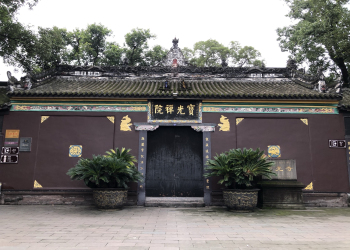
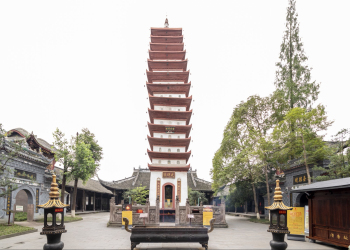
Baoguang Temple nestled in the serene northern suburb of Chengdu, is composed of a soaring stupa, five serene halls, and sixteen intricate courtyards. Boasting a history that dates back to the Eastern Han dynasty (25-220 AD), this storied temple has been revered as one of the "top four Buddhist temples in west China" since the Qing dynasty.
It is composed of 16 courtyards, five palaces, and a pagoda. Along its central axis, one finds an array of revered structures, starting with the Screen Wall inscribed with the "Fu" (luck) character, leading to the Gate to the Monastery. Further in, the Hall of Heaven Kings, the towering Dagoba, the Hall of Seven Buddha, the Depository of Buddhist Sutras, and finally, the serene Zixia Mountain await.
Baoguang Temple houses a trove of Buddhist art and relics, including approximately 500 statues of Arhat, the disciples of the Buddha, and 13 Sarira, sacred relics highly venerated in Buddhism. These treasures, along with the temple's serene atmosphere and lush surroundings, make Baoguang Temple a veritable jewel of Buddhism in China, attracting pilgrims and tourists alike from near and far.
Recommended Visiting Time: 2-3 hours
Opening Hours: 8:00-17:00
Ticket Price: CNY 5
Location: No. 81, Baoguang Street, Xindu District, Chengdu City
Zhaojue Temple
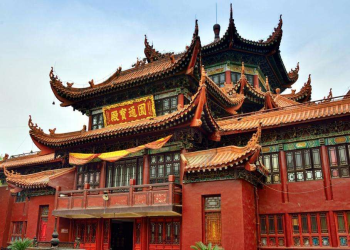
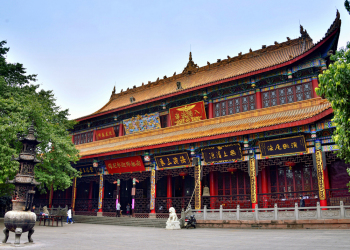
Nestled in the northern reaches of Chengdu, a mere five kilometers from the bustling downtown area, lies Zhaojue Temple, renowned as the First Buddhist Temple in West China. Originally known as "Jianyuan Temple," it was later renamed "Zhao Jue" during the Tang Dynasty.
Along its central axis, travelers are treated to a spiritual journey that begins at the Gate, continues through the Octagonal Pavilion, Tianwang Hall, and Daxiong Hall, and culminates at the Depository of Buddhist Sutras. Off to the sides, one encounters various pavilions, towers, and halls, including the Avalokitesvara Pavilion, Yushu Tower, Stone Buddha Hall, Dashi Hall, Xianjue Hall, Bell Tower, and Drum Tower. Further still, one finds the magnificent Yuantong Grand Hall, Meditation Hall, Monk Hall, Vegetarian Restaurant, and the serene Free Life Pond.
For those seeking spiritual solace, Zhaojue Temple offers a peaceful environment where one can pray and meditate, connecting with the essence of Buddhism.
Recommended Visiting Time: 1 ~ 2 hours
Opening Hours: 08:00-17:00
Ticket Price: free
Location: No.333 Zhaoqing Road, Chenghua District, Chengdu
Qingyang Palace
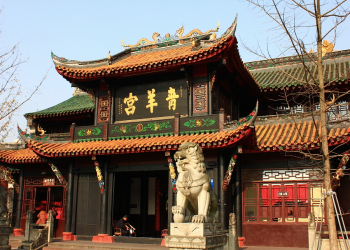
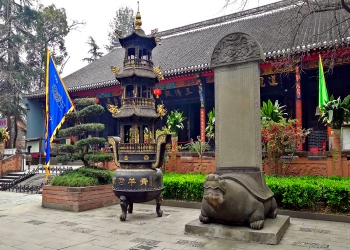
Qingyang Palace, also known as Qing Yang Gong, stands as one of the most illustrious Taoist temples in China, nestled gracefully in the northwestern corner of Chengdu, Sichuan Province. This sacred site, originally erected during the prosperous Tang Dynasty (618-907), serves as a testament to the flourishing era of Taoism. While much of the temple has undergone restoration over the centuries, particularly during the Qing Dynasty (1644-1911), the essence of its historical grandeur remains intact. Among the awe-inspiring structures that stand today are Sanqing Hall, Doulao Hall, Hunyuan Palace, the majestic Eight Trigrams Pavilion, and the enigmatic Wuji Palace.
Within Qingyang Palace, numerous exhibits of Taoist cultural relics showcase the rich tapestry of Taoist traditions. Among these treasures, the wooden engraving of the Dao Zang Ji Yao (Abstract of Collected Taoist Scriptures) and the stone sculpture of Patriarch Lu Dongbin, a renowned Taoist Immortal in Chinese history, are particularly noteworthy.
As you wander through the serene precincts of Qingyang Palace, you'll find the temple's teahouse bustling with locals and visitors alike. Here, they gather to enjoy a meal, sip tea, and play Mahjong, a traditional pastime deeply ingrained in Chengdu's culture. If you have the time, joining the locals for an afternoon of leisure at the teahouse is a remarkable way to immerse yourself in the pulse of China's off-the-beaten-path lifestyle.
Recommended Visiting Time: 1hour
Opening Hours: 08:00-17:00
Ticket Price: CNY10
Location: 1st Ring Road, Qingyang District, Chengdu
Mount Qingcheng
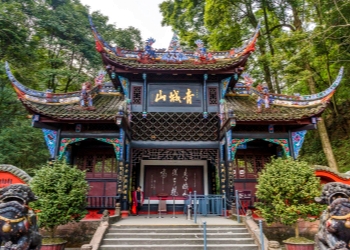
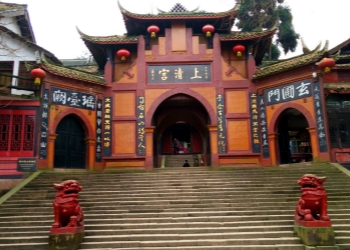
Mount Qingcheng, a renowned cradle of Taoism, counting itself as one of the four original birthplaces of the ancient Chinese philosophy in the country. During the illustrious Jin and Tang dynasties, numerous temples sprung up on the mountain, making it a vibrant hub of intellectual and spiritual exchange for Taoism. In the seventeenth century, its status as a center of Taoist learning was further consolidated.
Today, Mount Qingcheng stands as a UNESCO World Heritage Site, boasting over a dozen Taoist temples gracefully carved into the front facade of the mountain (while the rear offers a serene respite for nature enthusiasts). These temples, including the Erwang Temple, the Fulong Temple, and the Changdao Temple, are testaments to the traditional architecture of Western Sichuan, seamlessly blending history, culture, and nature.
Recommended Visiting Time: half day
Opening Hours: 08:00-17:00
Ticket Price: Front Mountain: CNY 50
Rear Mountain: CNY 20
Location: Dujiangyan City, Chengdu
Daci Temple
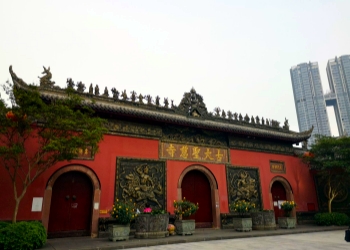
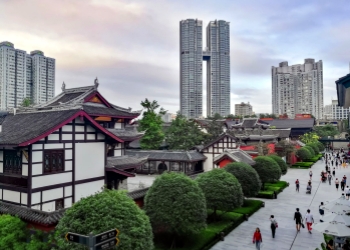
Nestled in the heart of Chengdu, amidst the bustling streets and towering skyscrapers, stands Daci Temple, a beacon of serenity and tranquility. This Buddhist sanctuary, with its rich history spanning over 1600 years, is a testament to the enduring spiritual legacy of the Tang Dynasty.
It is located next to Chunxi Road and Sino-Ocean Taikoo Li, holds a special place in history. It was here that the renowned monk Xuan Zang, during his travels from Chang'an (now Xi'an), found enlightenment. In 622, he was ordained as a Bhikkhu in Daci Temple, embarking on a journey of spiritual awakening. Although he later returned to Chang'an, his legacy lives on in the temple's halls and corridors.
Maitreya Hall, Avalokitesvara Hall, and Daxiong Hall house sacred relics and statues, inspiring awe and reverence. The Shuofa Hall and Depository of Buddhist Sutras are repositories of knowledge, where one can delve deeper into the teachings of Buddhism.
Visitors to Daci Temple are treated to a unique experience. They can admire the exquisite architecture, wander through the serene grounds, and savor the delectable vegetarian cuisine served in the temple's restaurant. A cup of Zen tea, sipped in the Meditation Hall, offers a moment of clarity and reflection.
Recommended Visiting Time: 1 hour
Opening Hours: 08:00-17:30
Ticket Price: Free
Location: Next to Taikoo Li & Chunxi Road, No.1 Dacisi Street, Jinjiang District, Chengdu




































